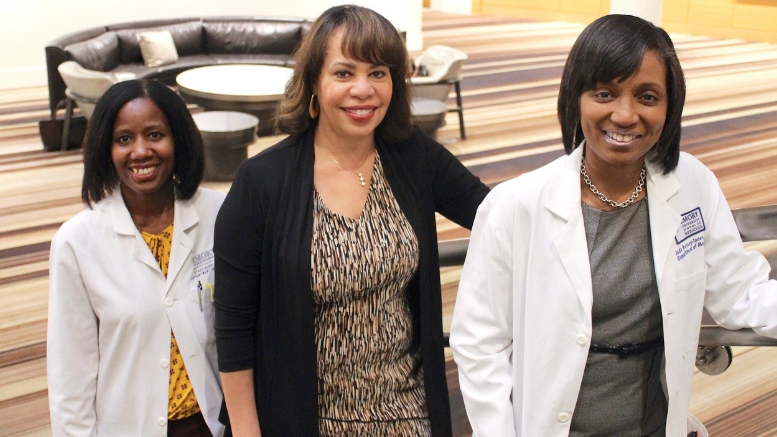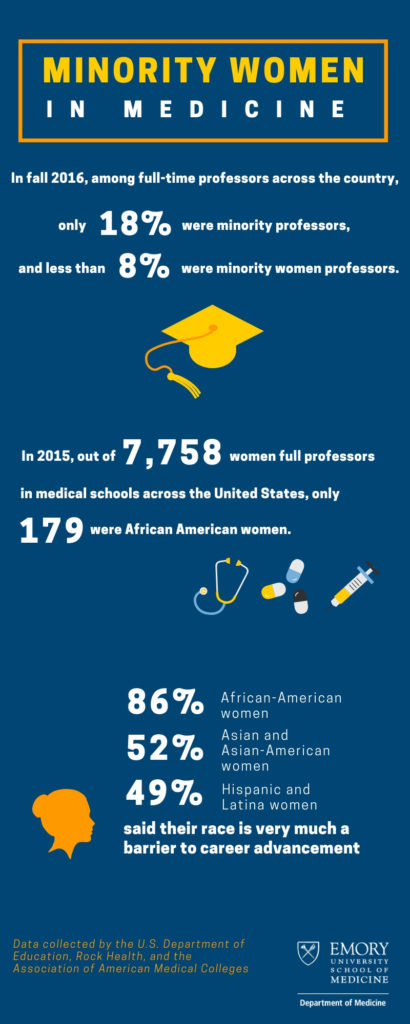Diversity has become a fundamental priority among industries across the nation, however, academia has been slow to change. The benefits of a diverse and inclusive employee base and company culture are increasingly recognized by today’s workforce. However, women, especially minority women, still face barriers.

Stacy Higgins, Janice Lea, and Jada Bussey-Jones, professors of medicine in the Department of Medicine
According to a survey conducted by Rock Health, 86 percent of African-American women, 52 percent of Asian and Asian-American women, and 49 percent of Hispanic and Latina women said their race is very much a barrier to career advancement. According to The Chronicle of Higher Education, on average, 75 out of every 100 full-time faculty members at four-year colleges are white. Five are black, and even fewer are Hispanic. While women represent over half of assistant professors and are near parity (44.9 percent) among associate professors, they accounted for less than a third (32.4 percent) of professors in 2015, according to the National Center for Education Statistics. The numbers are much lower for minority women. Based on data collected by the Association of American Medical Colleges in 2015, out of 7,758 women full professors in medical schools across the United States, only 179 were African American women.
In the world of healthcare and higher education, minority women have for years altered people’s perception of leadership with their proven ability to break gender and racial discrimination and to pave a new path for generations to come.
In the Department of Medicine, the growth of diversity is seen in the stories of its own professors of medicine.
Janice Lea, MD, professor of medicine in the Division of Renal Medicine, started her career at Emory three decades ago as a medical intern. As one of the very first African-American women to hold the position of professor of medicine at Emory, Lea was initially attracted to nephrology due to the high rates of kidney disease from diabetes and hypertension in the African American community.
“Throughout my 30-year career at Emory, I have seen it become more diverse with respect to securing more women and minorities in faculty positions, which is vital to Emory’s growth and attraction of exceptional diverse medical students, residents, and faculty,” says Lea.
She urges others to not let any stereotypes keep them from achieving their dreams and to always seek out role models to help along the way. “Emory is a place that fosters inclusion, encourages mentorship, and allows faculty to be engaged to the extent they want,” she says. “There are a tremendous amount of resources at Emory to succeed, but one must have the initiative to take advantage of these opportunities.”
Stacy Higgins, MD, professor of medicine in the Division of General Medicine and Geriatrics, started her first job at Emory because of the medical education opportunities and the ability to work in both inpatient and outpatient settings. When asked about her advice for other minority women who are entering the medical field, Higgins says, “Find a mentor who can help you negotiate the field and advancement. This could be someone of similar background, but might also be someone who you connect with but is not an ethnic minority or female. Be open to new opportunities, to challenge and push yourself in areas where you have a strong skill set but didn’t necessarily envision the position.”
According to Rock Health, more than a third of practicing physicians today are women, compared to just 17 percent in 1990. Witnessing the evolution of diversity first hand could empower minority women to seize opportunities that may not have been available years ago.
Jada Bussey-Jones, MD joined Emory as a physician educator in 1999 and worked at least nine sessions per week, including evenings and weekends, in Grady’s primary and urgent care centers. Now she serves as the chief of general medicine and geriatrics on the Grady campus and professor of medicine in the Division of General Medicine and Geriatrics. Bussey-Jones used to discuss her work and career with her grandparents, who received only a grade school education because there were no high school options for African-Americans in rural Georgia at that time.
“My similarities with many of the patients we serve at Grady have driven my passion for health equity and care for the underserved,” says Bussey-Jones. “I also feel there is a tremendous message about opportunities to support and promote diverse women at Emory and beyond. This achievement means a great deal to the individual faculty but also the students, trainees in the pipeline who can envision themselves in similar careers.”
As a junior faculty member and a woman of color, Jessica Alvarez, PhD, assistant professor of medicine in the Division of Endocrinology, says it is empowering for her to see such brilliant women in high-ranking positions in medicine.
“We still have a long way to go before we truly see equal representation across the board, including Latina women, but I appreciate the strides Emory has made,” Alvarez says.
The rise in minority women leaders in the Emory University Department of Medicine echoes the nationwide equity and diversity movement. However, much work is ahead. The unwavering commitment of these leaders to their profession serves as a strong reminder that the future of medicine is bright and inclusive.
“It isn’t enough to just hire a diverse staff. There must be representation in leadership,” says Kimberly Manning, MD, associate professor of medicine in the Division of General Medicine and Geriatrics. “The Department of Medicine is also preparing to appoint an associate vice chair of diversity, equity, and inclusion, which is a huge step in the right direction.”



Be the first to comment on "Breaking the barriers: minority women in medicine"